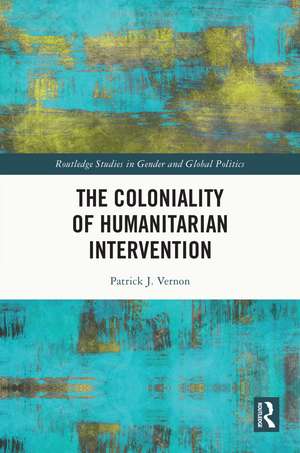The Coloniality of Humanitarian Intervention: Routledge Studies in Gender and Global Politics
Autor Patrick J. Vernonen Limba Engleză Hardback – 7 mai 2024
In particular, it highlights the ways in which dominant logics in these debates invoke subject-positions of extreme selfhood or otherness. These are identified as ‘The Brutal Dictator’, ‘The ISIL Terrorist’ and ‘The British Self’, framed as existing at various steps on ‘The Universal Path to Democracy’. In studying these extreme cultural figures of selfhood and/or otherness, the book examines the ways in which racism and heteronormativity work together to dehumanise certain populations under coloniality, and the ways in which this can be resisted. By studying the UK’s response to mass atrocities in Libya, Syria, Iraq and Myanmar between 2011 and 2018, it uncovers the extent to which these debates continue to operate through a colonial script. The book notably studies failed interventions (Syria) and non-interventions (Myanmar) as significant objects of study which, alongside the comments of UK legislators opposing the case for violence, help to expose the ongoing impact of colonial identities in the formulation of contemporary foreign policy. As well as looking at the British case, the book reflects upon changing norms of humanitarian intervention from the 1990s to the present day, including what might be understood as the rise and fall of R2P. The book also makes a distinct contribution to queer international relations scholarship, broadening what Vernon calls ‘the homonormative turn’ with a renewed focus on heteronormativity as a racist and globally-dominant episteme.
Offering both a theoretically informed analysis of humanitarian intervention and a practical guide for possible strategies to resist future iterations of liberal violence, this book will appeal to scholars, students, policy-makers and NGOs interested in R2P/humanitarian intervention, queer/decolonial/feminist international relations, and British politics.
Din seria Routledge Studies in Gender and Global Politics
-
 Preț: 304.37 lei
Preț: 304.37 lei -
 Preț: 382.54 lei
Preț: 382.54 lei -
 Preț: 416.22 lei
Preț: 416.22 lei -
 Preț: 416.22 lei
Preț: 416.22 lei -
 Preț: 317.76 lei
Preț: 317.76 lei -
 Preț: 389.97 lei
Preț: 389.97 lei -
 Preț: 399.55 lei
Preț: 399.55 lei - 17%
 Preț: 258.30 lei
Preț: 258.30 lei - 18%
 Preț: 260.45 lei
Preț: 260.45 lei - 17%
 Preț: 269.75 lei
Preț: 269.75 lei -
 Preț: 389.38 lei
Preț: 389.38 lei -
 Preț: 379.09 lei
Preț: 379.09 lei -
 Preț: 386.99 lei
Preț: 386.99 lei - 21%
 Preț: 257.68 lei
Preț: 257.68 lei - 19%
 Preț: 111.18 lei
Preț: 111.18 lei -
 Preț: 352.51 lei
Preț: 352.51 lei - 21%
 Preț: 246.93 lei
Preț: 246.93 lei -
 Preț: 383.17 lei
Preț: 383.17 lei -
 Preț: 389.66 lei
Preț: 389.66 lei -
 Preț: 386.68 lei
Preț: 386.68 lei
Preț: 765.01 lei
Preț vechi: 1103.26 lei
-31% Nou
Puncte Express: 1148
Preț estimativ în valută:
146.40€ • 152.28$ • 120.86£
146.40€ • 152.28$ • 120.86£
Carte tipărită la comandă
Livrare economică 14-28 aprilie
Preluare comenzi: 021 569.72.76
Specificații
ISBN-13: 9781032608631
ISBN-10: 1032608633
Pagini: 184
Dimensiuni: 156 x 234 mm
Greutate: 0.5 kg
Ediția:1
Editura: Taylor & Francis
Colecția Routledge
Seria Routledge Studies in Gender and Global Politics
Locul publicării:Oxford, United Kingdom
ISBN-10: 1032608633
Pagini: 184
Dimensiuni: 156 x 234 mm
Greutate: 0.5 kg
Ediția:1
Editura: Taylor & Francis
Colecția Routledge
Seria Routledge Studies in Gender and Global Politics
Locul publicării:Oxford, United Kingdom
Public țintă
Academic, Postgraduate, and Undergraduate AdvancedCuprins
1. Introduction 2. Queering Humanitarian Intervention as Colonial Violence 3. The Brutal Dictator: Targeting Families, Forming Evil Alliances 4. The ISIL Terrorist: Islamophobia and the Battle for Survival 5. The British Self: Colonial Masculinity and the (Non)Use of Force 6. The Universal Path to Democracy 7. Conclusion
Notă biografică
Patrick J. Vernon is a Lecturer in Gender and War Studies in the Department of War Studies at King’s College London, UK. Their research studies the role of gendered, sexual and racialised representations in discourses and practices of security. They are particularly interested in the study of political violence from the micro to the global level, having researched topics including online abuse, hostile media representations of minoritised groups, genocide and humanitarian intervention. Patrick has published in journals including Millennium, International Studies Review, International Political Sociology and The British Journal of Politics and International Relations.
Descriere
This book scrutinises the practice of humanitarian intervention to explore the extent to which racism and heteronormativity, rooted in colonial understandings of time and space, are enacted through the UK’s responses, failed responses, and non-responses to atrocity crimes.
